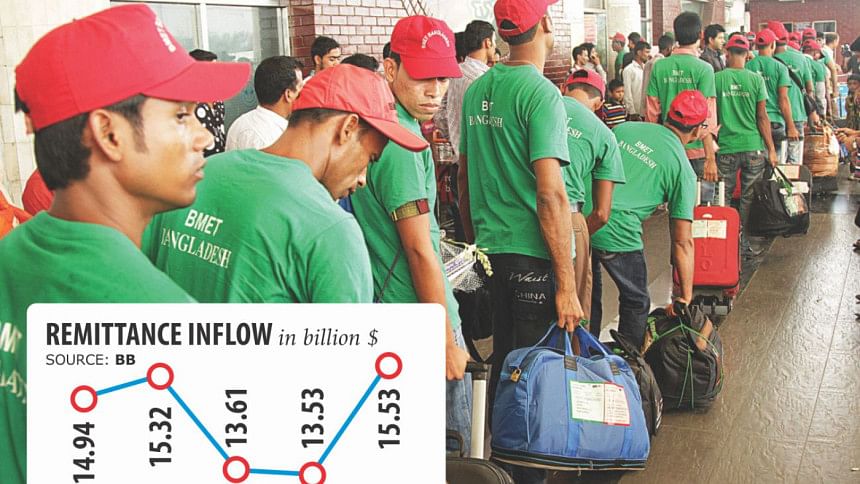Remittance buoyant

Remittance hit an all-time high of $15.53 billion in 2018, giving a breather to the country's ongoing foreign exchange crisis.
Last year's inflows were 14.79 percent higher than 2017's, according to data from the central bank. The ongoing depreciating trend of taka against the US dollar, a strong stance taken by the central bank to fight illegal money transfers and the good commission offered by banks to remitters were the main reasons behind the spike, analysts said.
Remittance, one of the main drivers of the country's economic growth, sank to a six-year low of $13.53 billion in 2017. This had an adverse impact on the country's foreign exchange reserves and balance of payments.
Despite the record amount of remittance, the banking sector is still facing a shortage of greenbacks because of the rising trend of imports, said a Bangladesh Bank official.
The central bank has been injecting dollar into the money market on a regular basis to offset the foreign exchange crisis.
The local currency has been depreciating in recent months, which caught the attention of the Bangladeshi diaspora, said Syed Mahbubur Rahman, chairman of the Association of Bankers, Bangladesh, a platform of banks' managing directors.
On January 2, the inter-bank exchange rate stood at Tk 83.90, up 1.45 percent from a year earlier.
In recent times, the central bank has also beefed up its monitoring on the financial sector to tackle hundi, an illegal process of transferring money from a nation to another.
“It is finally reaping fruit,” said Rahman, also the managing director of Dhaka Bank.
Some banks, which earlier faced shortage of foreign exchange to settle their letters of credit, have been offering high commission to hook remitters so that they send their hard earned money through them.
“The remitters responded to the offer,” he added. The upward trend of remittance would help the lower middle income group, said AB Mirza Azizul Islam, a former finance advisor to a caretaker government.
They would spend more, which, in turn, would boost the GDP. “The target for GDP growth is usually achieved when the consumer demand rises.”
The country's current account balance, which has been facing a large deficit for long, will get a respite, he said.
Islam, however, expressed his concern over the sustainability of the trend considering the ongoing trade-related disputes.
“Many well-reputed agencies have recently forecasted that the global GDP growth will slow down this year, which will not bring any good for remittance inflows.” Islam advised the government to give more emphasis on exporting skilled manpower as per capita remittance of Bangladeshi migrant workers is much lower than their peers.

 For all latest news, follow The Daily Star's Google News channel.
For all latest news, follow The Daily Star's Google News channel. 



Comments